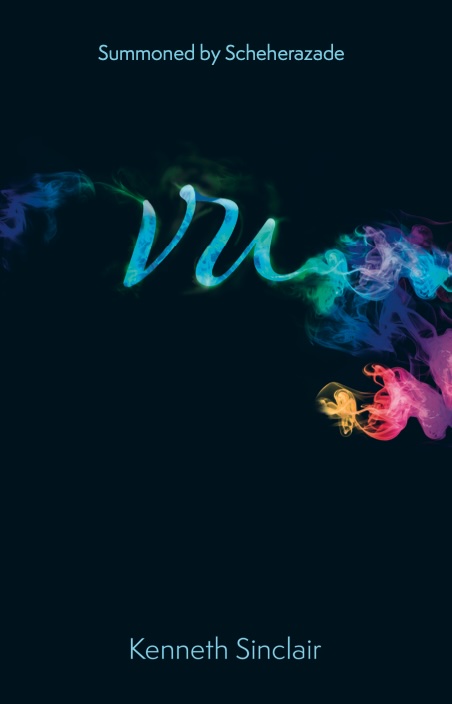What kind of experimental fiction is Kenneth Sinclair’s debut novel Vu? Is it, indeed, a novel – or a new form entirely? Reviewing for the Historical Novel Society, Susie Helme exclaims: “I’ve never seen a book like this!” She goes on to describe every paragraph as “a jewel, an ‘iridescent text that causes others… to quiver a little.’ They flit like butterflies, never quite anchored, like Japanese tanka court poetry, little bubbles linked not so much by narrative but by theme or emotive effect.” Read her full review.
Vu is French for ʻseen,ʼ and refers to what a reader sees in the mind’s eye when reading. Brendan McKelvey writes in Foreword magazine: “Epic in scope, the literary novel, Vu, is made up of woven-together historical tales used to deliver a thorough picture of the past.”
What did Sinclair intend?
What did Sinclair himself have in mind when he conceived Vu? A pioneer who thinks outside the box, his aspiration was to attempt experimental fiction: a new form. An avid reader, he wanted to bear witness to the terror, the tragedy, the beauty and the wisdom of two thousand years of world culture as it has reached him through books. His approach is to isolate fragments, but he needed to find a frame to put them in: “After a lifetime of reading, looking at art and listening to music, I found myself searching for a form in which to express the things that most impressed me. Having been brought up on the Thousand and One Nights, it struck me: here was a way. But I wanted to reverse the gender roles. Out of this arose Vu.”
A captive storyteller
Gabriel is a captive storyteller who narrates to the Princess Scheherazade in order to see her through the nights “those interminable nights” with a tale. We follow him down torchlit corridors to the Princessʼs apartments where we find her reclining on her juniper couch. In between, we catch a glimpse of him in a courtyard conversing with Scheherazadeʼs former storyteller, an old man seated cross-legged beneath a palm, fingering prayer-beads. Then we come upon Gabriel in his cell where he has: “leisure to reflect on those French writers who might have been attracted to a fate similar to mine. Gérard de Nerval had conjured with a history, mingling memories of his studies with fragments of dreams. And had not Huysmans contemplated the fascinating prospect of writing a novel concentrated to a few sentences, that would open vistas where the reader could muse.”
A frame within a frame
Post-modern experimental fiction, Sinclair sets his frame narrative within a further frame, and we see the author slipping in and out of his story with his blue pen poised above his pad and his dog patiently waiting for a walk. Or the telephone rings. Or childhood scenes are recalled, and we catch a glimpse of a tousel-haired boy playing with a model stage-set or building a house of cards. We watch with this same boy as he watches through the deepening dusk while the lamp-lighter makes his rounds. Finally—opaque, unless you know—Sinclair signals his birth with the circling of an osprey over the Ythan.
How to read Vu
How to read an experimental fiction book like Vu? It reaches back into antiquity and forward to the end of the twentieth century. Each chapter contains a number of sections which are grouped thematically. Even Susie Helme found this “exhausting.” But Sinclair did not imagine readers taking Vu as a continuous read. Rather he imagined his readers dipping in, like swallows swooping over a pool, taking a beak-full of water, a little here and there, pausing to ponder and dream. Passages may also inspire research. I for one have found myself devouring Wikipedia articles, finding Vu an intriguing springboard, a window on the world. And I have given readings of whole chapters, when the poetry of the writing held my audience spellbound.
The ambiguity of the human condition
Although, in Vu, you will not be carried along by the intricacies of plot and character-development needed for long, continuous reading, there is a little of each. Scheherazade is an archetype of mystery and glamour, but she self-reveals as well-read in her own right and slowly unbends towards her captive storyteller “dark and hazel eyes meeting.” Meanwhile, Gabriel demands to know when he will be freed. The enigmatic old storyteller questions the meaning and value of the word, and readers may recall this when, in the closing chapter, Gabriel himself seems ambiguous about his fate. Just like a human being!
Gillian Paschkes-Bell
Editor, Pantolwen Press
Pantolwen Press is the literary imprint of Bryn Glas Books
VU was published on 19 December 2024
Order direct from Gwales, the on-line shop of the Books Council of Wales
Read more about Kenneth Sinclair
PREVIOUS PUBLICATIONS
The Seaborne and The Priestʼs Wife by A G Rivett
first books of the time-slip fantasy, the Isle Fincara Trilogy
PUBLICATIONS PENDING
The Shareg by A G Rivett
Heart Explosions the poems of Barbara Loveland
Gillian is also working on her own novel.


